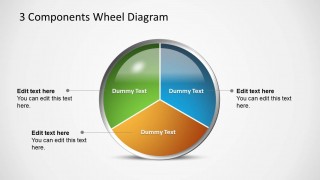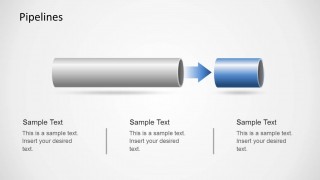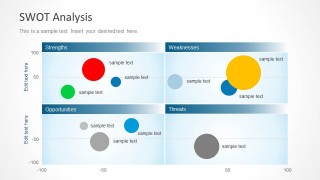Learn more how to embed presentation in WordPress
- Slides
- 43 slides
Published Sep 22, 2013 in
Business & Management
Direct Link :
Copy and paste the code below into your blog post or website
Copy URL
Embed into WordPress (learn more)
Comments
comments powered by DisqusPresentation Slides & Transcript
Presentation Slides & Transcript
Intel - Gaming Up the Promise of Digital LearningSasha A. Barab, Professor & Executive DirectorKathryn Dutchin, Creative ProducerAlan Gershenfeld, President
Game-Infused, Community-Based Learning Framework and PlatformThe Journey Builder 101 framework and platform will be used to efficiently and effectively adapt existing best-of-breed courses, as well as produce additional types of experiences, that leverage:game-infused learninglearning sciences research, andcommunity-based infrastructure. Learning challenges will be framed as Journeys with Quests that leverage powerful tools and address meaningful problems, all as part of a community of practice that, along with learning facilitators, will ensure the rigor, relevance, and value of that which is being learned.Additionally, there will be a strong social-network component to support ongoing and teacher-owned learning and collaboration
Core Assumptions of the PlatformSupplemental vs. Full CurriculumDesigned to cover full course content as opposed to supplemental games; the “dog” rather than the “tail” Game vs. Multiple ModalitiesUsing game mechanics where aligned with learning and impact objectives and non-game where not aligned; a gamified context is provided for all approachesRigid vs. Flexible and ModularWhile carefully curated, teachers have opportunity (where appropriate to learning experiences) to unbundle, mod and configure to meet their needs.Product vs. Optimized ServiceContinually optimized for leaning and social impact at scale; work with stakeholders and data to evolveContent Transmission vs. Transformational Learning Providing engaging learning trajectories intended to connect the content, the teacher, and those contexts of use in which the course content has value
‘Theory of Change’
Martha’s Story (see Prezi)Martha , a novice teacher searches the internet for lesson plans and finds the Engage Community and registersA community discussion leads her to try the unit plan builder toolA notification is emailed that she has earned a badge and can start a Journey to learn about Project Based ApproachesMartha works on the Project Based Approaches Journey and tracks her progress on her profile pageBecause sharing with the community is a formalized activity within the Journey, Martha becomes accustomed to sharing, receiving feedback, and discussing with peersContinuing through her journey she grows a portfolio of achievements, a network of support and digital teaching toolsMartha is a digitally powered teacher
Needs/Landscape/Opportunity ProcessOur review included:Analyses of the Elements content, Intel Teacher Community, and Intel Smart Tools.Analysis of prominent online Professional Development (PD) providers, including:Education Focused (Annenberg Learner, Edutopia, Edmodo, PBS TeacherLine, NEA Academy, Online EdConsumer Focused (Google, Apple, Microsoft content is centered on product integration in classrooms)An examination of current research and development regarding professional development, as well as games and impactAn examination of our design infrastructure, theory of change, and success experiences.Based on these, the following process steps occurred:Mockups were shared, stakeholder discussions occurred, prototypes were designed.A critical stakeholder analysis occurred at Intel where mockups were presented and critiqued, and subsequent debriefing with stakeholders occurred.A substantial revision of the vision occurred, new mockups were generated, and the prototyping of components were tested with pre-service teachers.
Changes in Our ThinkingFrom Quest-Based Games to a Game-Infused Community Learning Platform with Multiple ModalitiesGame as …Dog vs Tail!
Needs/Landscape/Opportunity Analysis
Needs/Opportunity (Summary of Implications)NeedsEnhance Intel resources (courses, community, smart tools) to be better integrated, more engaging, and grounded in learning sciences principlesProvide ongoing, embedded, collaborative, flexible, personalized experiences that support pre-service and in-service teachers in unlocking the promise of digital learningSupport players, facilitators, designers, and researchers with actionable analytics that allow for tracking, optimizing, and incentivizing participationStrategiesAdopt a “connected learning” model, engaging collective strengths, implicit knowledge, and contextualized meaning makingAssemble a high-quality team that has the diverse skillsets related to teacher PD, learning sciences, game design, and impact-based research Develop a game-infused, community-based platform that leverages multiple modalities aligned to meet learning goals and that can be continually optimized for sustained and scalable impact
Background ResearchGame DesignGamificationCommunity of Practice
Enabling Sector TrendsGame-Based-Learning: Informal LearningAnyone can play anywhere, anytime.$7billion2012 digital game sales(online + digital downloads)Parents desperately want games that are good for kidsTop industry talentlooking for meaningDisintermediation enables Indie-game sectorGAMES FOR CHANGE
Enabling Sector TrendsGame-Based-Learning: Formal LearningIncreasing ubiquity oftechnology in classroom 2012 revenue from educational publishing(K12)Teachers looking to leverage technology to better engagestudentsTop industry talent embracing games and learningDisintermediation enablesdirect-to-teacher distribution$8billion
Scholarly Research on ValueAcademic PublicationsRole PlayingSituationally ImportantFailing SafelyMeaningful ConsequencesPersonally ValidatingFun and EngagingPersonalized ChallengesPervasive AccessEmbedded AssessmentConclusions: Federation of American Scientists and the National Science Foundation strategic & analytical thinking problem solving systems thinking team building planning & executionGames foster critical21st century literacy skills motivation & goal orientation high time on task contextual bridging team building creativity and collaborationGames foster critical21st century job skills
WHAT IS GAMIFICATION?It's using game mechanics to help you drive participation, engagement and loyalty on your online property, site or community.What are game mechanics? They're tools that leverage our innate desire for competition, achievement, status, reward, self-expression and altruism. They include:Earning badges, trophies and achievementsTracking and rewarding online activityCreating virtual identities for self-expressionCollaborating as part of a teamSpreading the word via Facebook and TwitterBy wrapping game elements around an existing site or online service, it can provide compelling user experiences, engage users more deeply, and drive long-term loyalty.
Gamification works because it taps into our needs and desiresPeople have fundamental needs and desires - for reward, status, achievement, self-expression, competition, and altruism among others. These needs are universal, and span generations, demographics, cultures and genders. The table above explains how game mechanics hit on the sweet spots of those behaviors.
Communities of PracticeCharacteristics of a Community of Practice:a common practice and shared enterprise opportunities for interaction and participation;mutual interdependence overlapping histories, practices, and understandings among membersmechanisms for reproductionRespect for diverse perspectives and minority views Trajectories of expertise from novice to expert
Online Communities of PracticeCreate SupportAnytime Anywhere BoundedUsability SociabilityOne Space Bounded GroupsOnline Web-SupportedProduct Ongoing Service“Community” Supporting Practice“Community” Socio-Technical Networks“no community can fully design the learning of another … [however] no community can fully design its own learning” (p. 234).
Game-Infused, Community-Based Learning Framework and Platform”We envision a Game-infused community of practice that supports teachers as they pursue engaging and personalized trajectoriesto unlock the promise of digital learning in their classrooms." Teacher ProfileJourney BuilderCommunity Assets
Tanya’s Story (see Prezi)Tanya attends an ITA presentation and earns a badge and an invitation to access new tools within the Engage CommunityShe discovers like minded educators in the community and a wealth of tools and resourcesTanya shares some of her created lesson plans with the communityTanya is thrilled to have easy access to tools, resources, and community discussions all within her digital portfolioShe receives an alert that the community has commented on her post, a newer teacher has questions about her lesson plan. Tanya is happy to discuss and offers to connect in the future. Tanya has become a Mentor and continues to grow her identity within the community
Journey Builder
Project Based Approaches Quest LevelCourse = JourneyModule = Quest-lineLesson = QuestActivity = Challenge
Case-basedAnalysisResearch: Analysis and Deconstruction3-D GameTool: Unit Plan BuilderPoll and Visual Ranking ToolProject or NotClassroomPossible challenges withcommon principles:EngagingSocialLearningFun (etc.)Example Quests/ Challenges
Project Based Approaches JourneyRole: Researcher, Designer, Consultant, Evaluator, Project Manager, ImplementerTools: Unit plan builder, reflective tools, thinking tools, management tools, online mentorResources: Articles, worksheets, checklists, simulations, examples, rubrics, timelines, critical peer feedbackSkills: Critical analysis, activity planning, unit assembly, project management, implementation strategies, effective communication, standards alignmentOutputs: Project based unit plan, journal reflections, completed worksheets, assessment timeline, implementation plan, supportive network
Project Based Approaches Journey“Creating units that inspire students to develop abilities thatunlock conceptual tools, conquer standards, and change the world”
Project-Based Unit Quest-Line ExampleQuest 1: What Makes a Project a Project?Q1 (1) KWLH ChartFill out your KWLH chart (and post)Q1 (2) PollingWhich project based example applies to me?Show community totals and members who voted similarlyQ1 (3) PBA vs. ConventionalSorting features challengeQ1 (4)Transformation ToolArm the transformer with features, hit GO and it transformsQuest 2: Why Do Projects Anyway?Q2 (1) Identify Benefits Pillars GameAlign the research with the termQ2 (2) Visual Ranking ToolPersonal Ranking of BenefitsNarrate your rank choicesQ2 (3) Student Engagement ChallengeAnalyze student casesAssign Project Strategy Save the World (feedback)Q2 (4) Student OutcomesRead thank you notes from students whose class you transformed in Q1 (4)Revisit your benefits rankingsAre they still valid?Q2 (5) Build your comicDrag Maria’s solution bubbles into appropriate cells to address Abe’s concernsQuest 3: The Right Ingredients, Cooking up a Project+ Q1 Adult and Student Roles + Q2 Project Structure+ Q3 Learning ExperienceQuest 4: Unlocking the Unit Builder
The Intel Digital Learning StudioEnter game hereSelect a virtual mentorTest your skills in a virtual classroomPortable tools for use in the real world
Profile Page
Gamification & BadgingMore than token reinforcementBragging rights for accomplishmentsUnlocking productive trajectoriesInviting new users to the systemBuilding blocks of a portfolio identityConnecting User baseMozilla Open Badge CompliantThe use of game design techniques and mechanics to solve problems and engage audiences.Quest BadgesCommunity BadgesMeta BadgesLimited Time BadgesInvitation Badges
Example BadgesSharing RubricsHas shared (1,5,12,25) rubrics with the communityLet’s TalkHas provided feedback on 15 community submissionsPBA ImplementerHas completed PBA Quest-line 6 and posted assessment of class useCore Moderator (2014)Recognizes Community Moderators by annual badgePop-Up ChallengeLimited opportunity surprise challenge activities, drives anticipation and excitement
Personalized PortfolioMy FriendsMy Work My ImpactMy MentorsMy Journeys
Community Page
Challenges, Tools, & BookmarksChallengesTaste of journeyRecruitment techniqueIntel ToolsUnit Plan Builder (5 Uses)Student Facing Ranking ToolBookmarksPopular ResourcesHighlight Strengths
Contributions & B-BoardsUser Created Outputs from Intel ToolsUnit plansAssessment TimelinesImpact GuidesJive (Teachers Engage) IntegrationPulling Board TopicsBadge Sharing APISingle-Sign AuthenticationMozilla
The Intel Digital Learning Studio
The Intel Digital Learning StudioLinked to online resources (Intel Tools, Articles, Lesson Plans, Video, Presentations, etc.)
Eco-System IntegrationITA CustomizationContent ModificationAvailable JourneysAdditional ResourcesITA FacilitationTraining and SupportFacilitator DashboardHost or present online in the Intel Learning Studio spaceOngoing OptimizationSystem modifications based on data pointsAssessments (Automated Feedback, Community Feedback, Facilitator Feedback)Nominate Lessons/Timelines/Etc
Roberto (see Prezi) Roberto signs up with an ITAParticipates in a facilitated journeyCreates profileJoins a conversation group with his classShare lessons and tools with each otherEarn badges and build profileRoberto stays active in the community after the class experience ends and goes on to become a facilitation leader
Facilitators Contributing to the SystemITAs/RTAs and Facilitators have been creating powerful contentFacilitators will now have the power to build quests and journeys of their ownFacilitators will curate the implementation, supporting stronger work
Single Sign-on ProfileUser profile across system components
Post-Secondary IntegrationAlign to Credit Bearing OpportunitiesIntegrate with ASU registration SystemIntegrate as Certificate at UniversityTrain and support course instructorsAnalyze data and optimize experienceOffer at a distance for ongoing credits
Research AnalyticsTracking and analysis of metrics Audience demographicsUptake of various content areasSticky timeFrequencyFind the “influencers” within the communityUnderstanding the reputational impactData for Facilitators, Researchers, Marketing, Etc.
Research Based OptimizationAnalysis is used to inform the strengths and challenges in the system so that the design can be iterated and optimized to achieve outcomes:Advanced knowledge and skills on cognitive, intrapersonal, and interpersonal dimensions manifested as understandings and performances.Support for personal development, identity evolution, and socialization.Increasing capacity for better opportunities in work and life.Social capital for further learning. ----------Advancing meaningful knowledge: Impact points per competency highlighting what Intel has powered up … Compelling multimedia stories of how teachers are unlocking the promise of digital learning … Broader research studies about the theory of change to inform PD … Ability (I know) Confidence (I can) Commitment (I will)
Logic Model Opportunity Analysis






